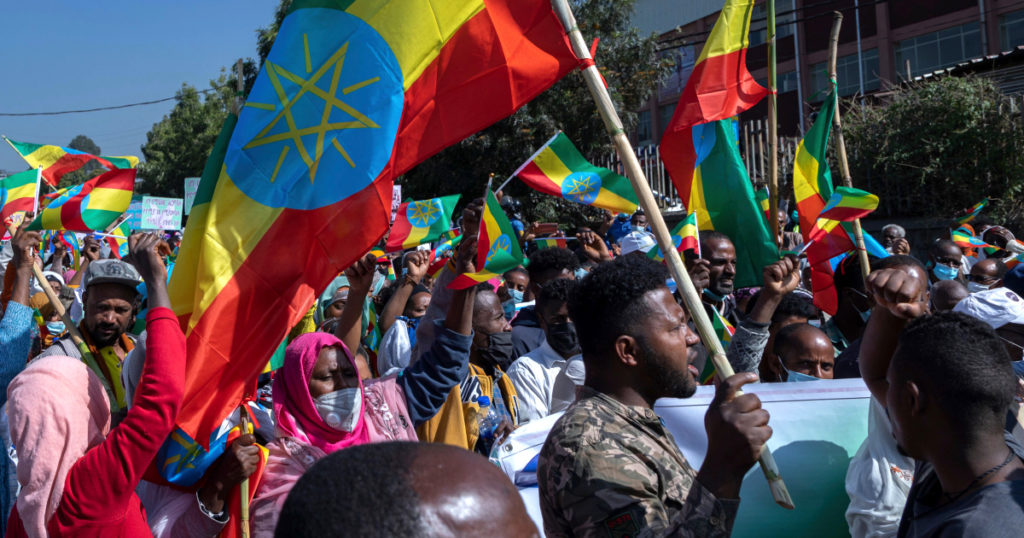SECAM: Calls for “Immediate Laying Down of Arms” in Ethiopia’s Tigray Conflict

Ethiopians hold national flags as they gather at an event organized by city officials to honor the Ethiopian military, at the Abebe Bikila stadium in the capital Addis Ababa, Ethiopia, Tuesday, Nov. 17, 2020. Ethiopia's Prime Minister Abiy Ahmed said in a social media post on Tuesday that "the final and crucial" military operation will launch in the coming days against the government of the country's rebellious northern Tigray region. (AP Photo/Mulugeta Ayene)
Sr. Jecinter Antoinette Okoth, FSSA
Following the month-long armed conflict between Ethiopia’s Federal Government and the Tigray regional State led by the political party of Tigray People’s Liberation Front (TPLF), the Symposium of Episcopal Conferences in Africa and Madagascar (SECAM) has called on the parties concerned to lay down the arms that have led to blood shade and resolve their differences amicably so that peace can be restored in the nation.
“We the members of the Symposium of Episcopal Conferences of Africa and Madagascar (SECAM) have followed with deep concern the deteriorating situation in the Tigray region of Ethiopia,” reads the statement signed by SECAM president Cardinal Philippe Nakellentuba Ouédraogo.
The statement echoes an appeal for peace by Pope Francis and the Ethiopian Catholic Bishops’ Conference (ECBC), “We join them in passionately pleading for immediate laying down of arms on the part of everyone involved in the conflict,” calling “All parties in the conflict to resolve their differences amicably through open dialogue, and in a spirit of brotherhood, respect, understanding and reconciliation.”
SECAM pleads further in their Saturday, December 5 statement, to local, national and international security personnel and agents to “safeguard the lives of all the people, especially civilians, to restore peace in the region.”
The escalating fight has led to destruction of property in the country, with several households displaced while many Ethiopian refugees have crossed borders to Sudan to seek for refuge.
According to the bishops, the “Daily media reports point to a growing humanitarian and security crisis not only in Tigray but in neighbouring Eritrea and Sudan (where) several innocent people have died, while many others have been displaced.”
They have called on the Church, civil organizations and all people of good conscience to provide basic needs including food, water and clothing to the displaced people, as a sign of solidarity.
Besides, “We call on all Christians on the continent and the islands to intensify prayer to God for an end to the conflict, and for the return of peace and normalcy in the region.”
Referencing their earlier statement written in the month of February on ‘Silencing the Guns,’ the Church leaders emphasized the need for respecting God’s creation by respecting human dignity.
“Africa has had enough of bloodthirsty people like Cain who killed his brother Abel without any reason, an act offensive to God,” reads part of the statement which adds, “Let us, therefore, always bear in mind that any form of violence perpetrated against a fellow human being is an offence against God, and a violation of the person’s dignity. For each human being is created in the image and likeness of God.”
Meanwhile in a report issued on Saturday, December 5 by Europe External Programme with Africa (EEPA), a Belgium-based Centre of Expertise with in-depth knowledge, publications, and networks, specialized in issues of peace building, refugee protection and resilience in the Horn of Africa has revealed that, according to the United Nations High Commissioner for Refugees (UNHCR) “Over 47,000 refugees from Ethiopia have now arrived in Sudan…with often nothing but the clothes they wear,” and at the same time the “Eritrean refugees in Tigray speak of lack of medical supplies.”
The Centre that cooperates with a wide network of Universities, research organizations, civil society and experts from Ethiopia, Eritrea, Kenya, Djibouti, Somalia, Sudan, South Sudan, Uganda and across Africa highlights further, “The fight is still taking place in many parts of Tigray which has complicated efforts to deliver humanitarian aid,” and discloses that “citizens are forced to participate in the war in Tigray against their will.”


